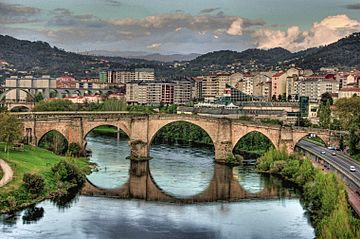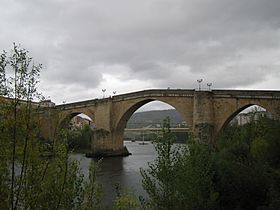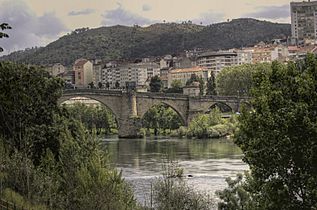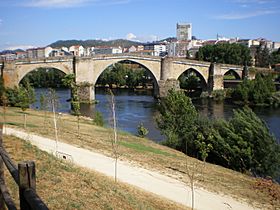Ponte Vella facts for kids
Quick facts for kids Ponte Vella |
|
|---|---|

Ponte Vella
|
|
| Coordinates | 42°20′43″N 7°52′7″W / 42.34528°N 7.86861°W |
| Carries | Accessible to pedestrians only |
| Crosses | Minho River |
| Locale | Ourense, Galicia, Spain |
| Official name | Ponte Vella |
| Other name(s) | Ponte Romana Ponte Maior |
| Characteristics | |
| Design | Arch bridge |
| Total length | 373 metres (1,224 ft) |
| Longest span | 43 metres (141 ft) |
| Clearance below | 38 metres (125 ft) |
| History | |
| Opened | 1230 |
The Ponte Vella (pronounced PON-tay VEY-yah) is a very old and famous bridge in Ourense, Spain. Its name means "old bridge" in the Galician language. People also call it Ponte Romana (Roman bridge) or Ponte Maior (great bridge).
This bridge is a footbridge, meaning only people can walk across it. It was built on top of Roman foundations. The Ponte Vella crosses the Minho River in Ourense. It stands high above the river, about 135 feet (41 m) (41 meters) up. This height helps keep it safe when the river floods quickly. For a long time, it was thought to be the biggest bridge in all of Spain.
Where the Bridge Is
The Ponte Vella is located in front of a chapel. It connects the city of Ourense with Santiago de Compostela, a famous city for pilgrims. For many years, the Ponte Maior was the only way to cross the Minho River. Another bridge was built in 1816. Much later, a modern bridge called Ponte Milenio was also built.
Bridge History
The very first bridge over the Minho River in this spot was built a long, long time ago. Some say it was built during the first century, when Emperor Augustus ruled. Others believe it was built during the time of Trajan, another Roman emperor.
This bridge is even mentioned in an old will from Doña Urraca. It says that the bridge was repaired with money from Ferdinand III. Since the Middle Ages, the Ponte Vella has been important for trade and for people traveling to Ourense.
The bridge we see today was mostly rebuilt in 1230 by a bishop named Lorenzo. He used the original Roman foundations, which are the strong bases of the bridge. It was repaired again in 1449 by Bishop Pedro de Silva. At that time, it was about 1,319 feet (402 m) (402 meters) long.
Sadly, the main arch of the bridge fell down in 1499. But the bridge was rebuilt again in 1679. After this rebuilding, it was about 370 metres (1,210 ft) (1,214 feet) long. It had seven arched sections, with the longest arch measuring 43 metres (141 ft) (141 feet). The bridge stands about 38 metres (125 ft) (125 feet) above the water.
Images for kids
See also
 In Spanish: Puente romano de Orense para niños
In Spanish: Puente romano de Orense para niños
- List of Roman bridges
- Roman architecture
- Roman engineering
 | Georgia Louise Harris Brown |
 | Julian Abele |
 | Norma Merrick Sklarek |
 | William Sidney Pittman |




